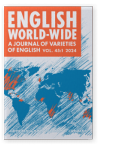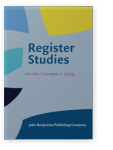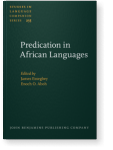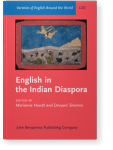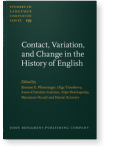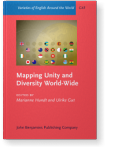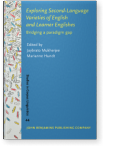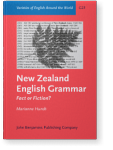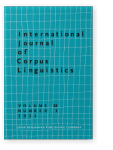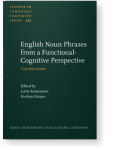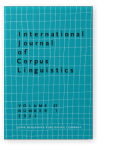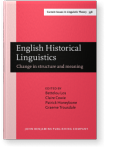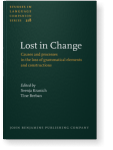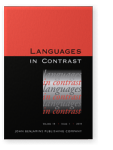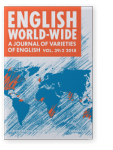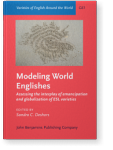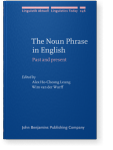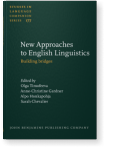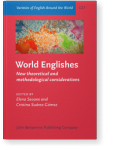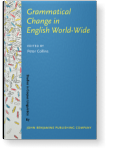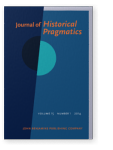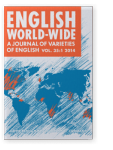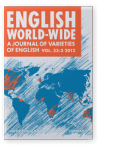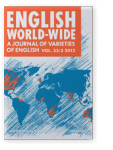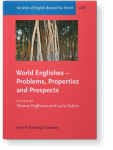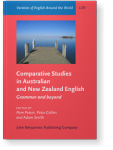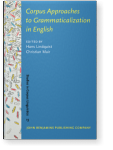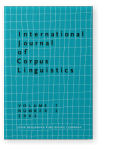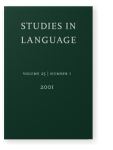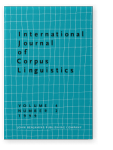Marianne Hundt
List of John Benjamins publications for which Marianne Hundt plays a role.
Journals
Book series
Titles
English in the Indian Diaspora
Edited by Marianne Hundt and Devyani Sharma
[Varieties of English Around the World, G50] 2014. ix, 244 pp.
Subjects English linguistics | Sociolinguistics and Dialectology
Contact, Variation, and Change in the History of English
Edited by Simone E. Pfenninger, Olga Timofeeva, Anne-Christine Gardner, Alpo Honkapohja, Marianne Hundt and Daniel Schreier
[Studies in Language Companion Series, 159] 2014. vi, 326 pp.
Subjects English linguistics | Germanic linguistics | Historical linguistics | Sociolinguistics and Dialectology | Theoretical linguistics
Mapping Unity and Diversity World-Wide: Corpus-Based Studies of New Englishes
Edited by Marianne Hundt and Ulrike Gut
[Varieties of English Around the World, G43] 2012. xiv, 294 pp.
Subjects English linguistics | Germanic linguistics | Sociolinguistics and Dialectology | Theoretical linguistics
Exploring Second-Language Varieties of English and Learner Englishes: Bridging a paradigm gap
Edited by Joybrato Mukherjee and Marianne Hundt
[Studies in Corpus Linguistics, 44] 2011. vi, 222 pp.
Subjects Corpus linguistics | English linguistics | Multilingualism | Theoretical linguistics
New Zealand English Grammar – Fact or Fiction?: A corpus-based study in morphosyntactic variation
Marianne Hundt
[Varieties of English Around the World, G23] 1998. xvi, 212 pp.
Subjects Corpus linguistics | English linguistics | Germanic linguistics | Morphology | Syntax
Articles
2023 Differences in syntactic annotation affect retrieval: Verb-attached PPs in the history of English International Journal of Corpus Linguistics 28:3, pp. 378–406 | Article
Prepositional phrases (PPs) play an important part in English argument structure constructions, but pose considerable challenges for linguistic investigations of any kind. In addition to the fact that PP-attachment is generally notoriously difficult to model computationally, a particularly… read more
2022 Constructional variation and change in N-is focaliser constructions English Noun Phrases from a Functional-Cognitive Perspective: Current issues, Sommerer, Lotte and Evelien Keizer (eds.), pp. 205–234 | Chapter
This paper revisits the emergence of N-is focaliser constructions. It is the first to systematically use qualitative evidence from the Oxford English Dictionary (OED) and Early English Books Online (EEBO) to establish the chronology of developments from a full clause to a parenthetical. In a… read more
2022 (The) fact is … / (Die) Tatsache ist … focaliser constructions in English and German are similar but subject to different constraints International Journal of Corpus Linguistics 27:1, pp. 1–30 | Article
N-is/ist constructions are elements in the left periphery of English/German sentences that have developed pragmatic meaning: they can be used as discourse markers with various functions, depending on the nominal element that is used in the construction. We use evidence from parallel and… read more
2022 Chapter 8. Prepositions in Early Modern English argument structure and beyond English Historical Linguistics: Change in structure and meaning, Los, Bettelou, Claire Cowie, Patrick Honeybone and Graeme Trousdale (eds.), pp. 201–224 | Chapter
This paper is the first to use a bottom-up, corpus-based, exploratory approach to the full range of prepositions in Early Modern English argument structure. Contrary to what previous research leads us to expect, the overall token frequency of prepositions during this period decreases, and they… read more
2021 “The next Morning I got a Warrant for the Man and his Wife, but he was fled”: Did sociolinguistic factors play a role in the loss of the be-perfect?* Lost in Change: Causes and processes in the loss of grammatical elements and constructions, Kranich, Svenja and Tine Breban (eds.), pp. 199–234 | Chapter
This chapter uses data from the Old Bailey Corpus to study the demise of the English BE-perfect between the 1720s and 1910s. The corpus provides ample evidence on the development in the period that saw the transition from BE to HAVE as perfect auxiliary in constructions with mutative verbs (i.e.… read more
2019 Variable article use with acronyms and initialisms: A contrastive analysis of English, German and Italian Languages in Contrast 19:1, pp. 48–78 | Article
Shortening is a common type of word-formation in many languages. Crystal (2008) distinguishes two kinds of abbreviation: initialisms and acronyms. Article use in English is variable with both acronyms and initialisms used as proper names (e.g. (the) UKIP, at the UN vs. at MIT). The question is… read more
2018 Debra Ziegeler. 2015. Converging Grammars: Constructions in Singapore English English World-Wide 39:2, pp. 243–250 | Review
2018 It is time that this (should) be studied across a broader range of Englishes: A global trip around mandative subjunctives Modeling World Englishes: Assessing the interplay of emancipation and globalization of ESL varieties, Deshors, Sandra C. (ed.), pp. 217–244 | Chapter
In subordinate clauses after mandatives such as recommend or require, English speakers can choose between a subjunctive or a modal construction. Studies of this alternation in second-language varieties of English (ESL) are scarce. Previous research looked at the distribution of subjunctives across… read more
2018 Chapter 5. Variable article usage with institutional nouns: An “oddment” of English? The Noun Phrase in English: Past and present, Ho-Cheong Leung, Alex and Wim van der Wurff (eds.), pp. 113–142 | Chapter
In English, singular institutional nouns like church or hospital are variably used with or without a definite article following verb-preposition collocations like go to and be at. British English has been reported to prefer the bare NP use whereas American English allegedly tends towards the… read more
2016 Introduction New Approaches to English Linguistics: Building bridges, Timofeeva, Olga, Anne-Christine Gardner, Alpo Honkapohja and Sarah Chevalier (eds.), pp. 1–12 | Article
2016 Error, feature, (incipient) change – or something else altogether? On the role of low-frequency deviant patterns for the description of Englishes World Englishes: New theoretical and methodological considerations, Seoane, Elena and Cristina Suárez-Gómez (eds.), pp. 37–60 | Article
All corpus linguists routinely come across language use that may, at first sight, appear to be erroneous: planning errors, slips of the tongue/pen or, in the case of contact varieties, evidence of interference from a substrate language. These apparent ‘errors’ are of potential interest because they… read more
2015 Do-support in early New Zealand and Australian English Grammatical Change in English World-Wide, Collins, Peter (ed.), pp. 65–86 | Article
Currently, do-support is obligatory with most lexical verbs in negation and questions. At the end of the 19th century it was still variable, in particular with verbs of the so-called know-group. Research on change in British and American English additionally reveals a marked regional difference in… read more
2014 Zero articles in Indian Englishes: a comparison of primary and secondary diaspora situations English in the Indian Diaspora, Hundt, Marianne and Devyani Sharma (eds.), pp. 131–170 | Article
The omission of articles where British or American English require either a definite or indefinite article is a typical feature of Indian English (IndE). Sharma (2005b) found that substrate influence played a role for the use of indefinite one in IndE, whereas pragmatic functions (givenness and… read more
2014 Introduction English in the Indian Diaspora, Hundt, Marianne and Devyani Sharma (eds.), pp. 1–8 | Article
2014 At the crossroads of language change, variation, and contact Contact, Variation, and Change in the History of English, Pfenninger, Simone E., Olga Timofeeva, Anne-Christine Gardner, Alpo Honkapohja, Marianne Hundt and Daniel Schreier (eds.), pp. 1–8 | Article
2014 The times they are a-changin’ — and so are the editors of EWW English World-Wide 35:1, pp. 1–5 | Article
2012 Animacy in early New Zealand English English World-Wide 33:3, pp. 241–263 | Article
The literature suggests that animacy effects in present-day spoken New Zealand English (NZE) differ from animacy effects in other varieties of English. We seek to determine if such differences have a history in earlier NZE writing or not. We revisit two grammatical phenomena — progressives and… read more
2012 Introduction: Mapping unity and diversity in New Englishes Mapping Unity and Diversity World-Wide: Corpus-Based Studies of New Englishes, Hundt, Marianne and Ulrike Gut (eds.), pp. ix–xiv | Article
2012 The hypothetical subjunctive in South Asian Englishes: Local developments in the use of a global construction English World-Wide 33:2, pp. 147–164 | Article
This paper studies the distribution and usage patterns in hypothetical if-clauses in a set of South Asian Englishes (SAEs), namely Indian, Pakistani, Bangladeshi and Sri Lankan English on the basis of web-derived newspaper data. Comparative evidence comes from newspaper texts in the British… read more
2012 “Off with their heads”: Profiling TAM in ICE corpora Mapping Unity and Diversity World-Wide: Corpus-Based Studies of New Englishes, Hundt, Marianne and Ulrike Gut (eds.), pp. 1–34 | Article
The main aim of our chapter is a methodological one, that of comparing a largely data-driven approach to regional variation in world Englishes and a corpus-based approach. As a case study, we examine tense, aspect and modality (TAM) differences between five varieties. Our investigation uses… read more
2011 Introduction: Bridging a paradigm gap Exploring Second-Language Varieties of English and Learner Englishes: Bridging a paradigm gap, Mukherjee, Joybrato and Marianne Hundt (eds.), pp. 1–6 | Article
2011 Discussion forum: New Englishes and Learner Englishes – quo vadis? Exploring Second-Language Varieties of English and Learner Englishes: Bridging a paradigm gap, Mukherjee, Joybrato and Marianne Hundt (eds.), pp. 209–218 | Article
During the workshop at the ISLE conference in Freiburg, the participants agreed to engage in an online discussion on how to bridge the paradigm gap in researching ESL varieties and EFL variants of English. The most productive strand of this discussion concerned the modelling of different Englishes,… read more
2011 Overuse of the progressive in ESL and learner Englishes – fact or fiction? Exploring Second-Language Varieties of English and Learner Englishes: Bridging a paradigm gap, Mukherjee, Joybrato and Marianne Hundt (eds.), pp. 145–166 | Article
New Englishes and learner varieties of English are both reported to overuse the progressive. Furthermore, previous research suggests that speakers of English as a Second Language (ESL) and learners of English as a Foreign Language (EFL) use the progressive construction differently, at times, from… read more
2009 Global feature — local norms? A case study on the progressive passive World Englishes – Problems, Properties and Prospects: Selected papers from the 13th IAWE conference, Hoffmann, Thomas and Lucia Siebers (eds.), pp. 287–308 | Article
This paper looks at the usage of the progressive passive in Inner and Outer Circle varieties of English. This syntactic pattern is a global feature in that it is found in practically all varieties of English world wide, but it is used with different frequencies in different Englishes and also shows… read more
2009 Concord with collective nouns in Australian and New Zealand English Comparative Studies in Australian and New Zealand English: Grammar and beyond, Peters, Pam, Peter Collins and Adam Smith (eds.), pp. 205–222 | Article
In English, nouns like government or team can be used with singular or plural verbs and pronouns. In the twentieth century, there seems to be a growing trend to use singular concord with most collective nouns. This change is particularly pronounced in American English but can also be found in other… read more
2004 The passival and the progressive passive: A case study of layering in the English aspect and voice systems Corpus Approaches to Grammaticalization in English, Lindquist, Hans and Christian Mair (eds.), pp. 79–120 | Article
Grammaticalisation of the progressive aspect and passive voice in English began in the Old English period; yet, the spread of the new patterns to all syntactic environments took several centuries. A fairly recent phenomenon is the co-occurrence of the progressive aspect and the be-passive. When the… read more
2002 Short term diachronic shifts in part-of-speech frequencies: A comparison of the tagged LOB and F-LOB corpora International Journal of Corpus Linguistics 7:2, pp. 245–264 | Article
The paper presents a comparison of tag frequencies in two matching one-million word reference corpora of British standard English, the 1961 LOB-corpus and its 1991 “clone” produced at Freiburg. Both corpora were tagged using a version of the CLAWS part-of-speech-tagger developed at Lancaster, and… read more
2001 What corpora tell us about the grammaticalisation of voice in get-constructions Studies in Language 25:1, pp. 49–87 | Article
Grammaticalisation studies are a potential meeting ground for theoretical linguistics and corpus-based approaches. The present paper uses evidence from the ARCHER corpus to investigate the relationship between frequency and the grammaticalisation of the get-passive. It seeks to verify whether the… read more
1999 "Agile" and "Uptight" Genres: The Corpus-based Approach to Language Change in Progress International Journal of Corpus Linguistics 4:2, pp. 221–242 | Article
This paper is a follow-up study to previous investigations based on the analysis of parallel British and American corpora from the early 1960s and 1990s. It focuses on variables that are suspected to contribute to the growing "colloquicdisation " of the norms of written English, that is, a… read more
